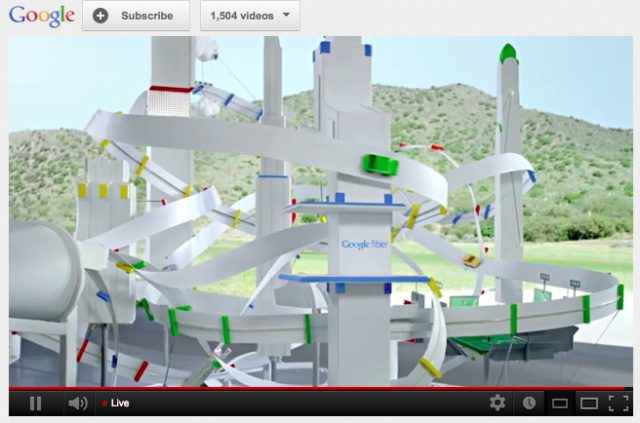
Google announced its highly anticipated Google Fiber service today, bringing 1Gbps Internet access to selected residents of Kansas City.
The service will be available for a $300 installation fee to households in Kansas City, and will launch this fall. It will also come with 1TB of Google Drive storage, and Google Fiber TV service. That includes high-definition cable channels and a DVR-style recorder that can record up to 500 hours of HD TV. The service is also going to be available symmetrically—meaning you can upload and download as much as you like at ridiculous speeds.
"We believe there's no need to wait," said Patrick Pitchette, Google's chief financial officer. "There's no need for caps. There's no need for slow—why slow?"
Google representatives pointed out that American ISPs have done a terrible job of maintaining high levels of speeds at low costs.
"Americans pay more per megabit than any other major world economy," said Milo Medin, the head of Google's Fiber project.
Two, nay, three packages
Google also announced that it would be releasing a Google TV Box, a Fiber box, and a Storage box (which includes 2TB of storage). The company has decided that the Nexus 7 will be the main remote device and will come standard as part of the package deal.
Google Fiber will be divided into two different services: Gigabit+TV, which includes a "full TV lineup," and the Nexus 7 tablet. It will cost $120 per month, but with a two-year contract, Google says it will waive the construction fee. The Gigabit Internet package will cost $70 per month, but won't include the TV box. With a one-year contract, Google will again waive its installation fee. By comparison, Comcast's newly announced 305Mbps service will cost $299 per month.
Surprisingly, Google will also offer 5Mbps (comparable to many existing broadband services) for free for seven years to anyone who chooses to pay for the installation fee up-front, as a way to "future-proof" local homes. Or, instead of paying a lump-sum, the company will also offer this comparatively slow broadband service at $25 a month for the first year.
This tactic appears to be a way for Google to get a toehold even amongst those that don't see the need to fully commit to Fiber.
"That seems to be one of the things for Google, is to get more and more credit card details of consumers," said Carolina Milanesi, a Gartner analyst, in a call with Ars on Thursday. "Even if a consumer doesn't drive anything for awhile, then we have them."

Fiberhoods FTW!
So where exactly will Google Fiber be available? The company isn't giving further specifics yet.
"We're going to deploy our network in areas where there's enough interest, and we're going to build in areas where there's the most interest," said Kevin Lo, general manager of Google Access.
Google has opened up a $10 pre-registration fee website where residents can show their interest, and will begin service once "40 to 80" people have signed up to what it's calling a "Fiberhood." Lo said that residents can pre-register by September 9, and will be notified about when they'll receive service.
"The fiberhoods that are at the top of the leaderboard, will get it first," Lo said.
So when will the rest of us get to taste this almost sarcastically fast Internet? Google's staying mum on that one.
In an e-mail to Ars, James McQuivey, a Forrester analyst, said that this won't affect the television industry in the immediate term, but may point the way forward.
"Even if it proves to be amazing, it's really not cost-effective and won't be widespread for a decade," he wrote. "So the TV industries won't be affected at all for the next several years because no one will redesign a global business because the economics of it have changed in one city. Unless Google has recently announced plans to roll out in 10 cities, this is just a really neat thing for Kansas City that every industry will watch closely in case it has the potential to spread.
reader comments
164